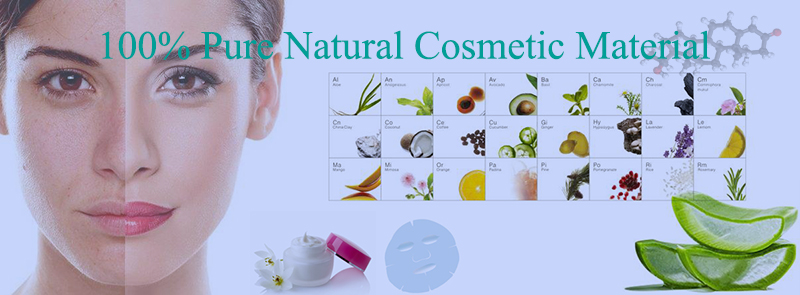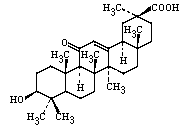1. Glycyrrhetinic Acid Overview
Glycyrrhetinic acid is a triterpenoid saponin compound. It differs from glycyrrhizic acid in that it has two glycosides, and it is present in licorice root. It is a main active ingredient in roots and rhizomes of Glycyrrhiza. Glycyrrhetinic acid is an important cosmetic raw material. It is used as a skin conditioning agent in cosmetics. It has anti-inflammatory, anti-allergic and anti-bacterial effects. It can be used in cosmetics to regulate skin’s immune function and enhance skin resistance. In addition, glycyrrhetinic acid can eliminate skin inflammation, prevent allergies, and cleanse skin.

| Product Name | CAS Number | INCI Name | |
| Glycyrrhetinic Acid | 471-53-4 | GLYCYRRHETINIC ACID | |
| Molecular Weight | Molecular Formula | Molecular Structure | |
| 470.68g/mol | C30H46O4 |
 |
|
| Product ID | Specification | Minimal Package | Minimal Order Quantity |
| BFSTAR2010 | 98% | 1KG | 1KG |
2. Glycyrrhetinic Acid Source
Licorice (Latin name: Glycyrrhiza uralensis Fisch) is an herb of genus Leguminosae. It is native to the Mediterranean, southern and central Russia, and Asia Minor to Iran. Most of wild licorice in China is distributed in Ningxia, Sinkiang, Shanxi, Inner Mongolia, etc. Licorice includes many active ingredients, such as glycyrrhizic acid, glycyrrhizin, glycyrrhetinic acid, licorice flavonoids and others. They are found mainly in licorice root, so thick roots of licorice are major drug sources. Licorice extract is also mainly used in pharmaceutical, health care and cosmetics filed.

3. Glycyrrhetinic Acid Manufacturer Specifications
| Product Name | Specification | Color |
| Glycyrrhetinic Acid | 98% | White powder |
| Items | Specifications |
| Content | ≥98.0% |
| Appearance | White or white crystalline powder |
| Physical Characteristics | |
| Loss on drying | ≤0.5% |
| Residue on ignition | ≤0.2% |
| Specific Optical Rotation | +145°—+154° |
| Heavy Metals | |
| Heavy metals | ≤20ppm |
| Plumbum | ≤1.0ppm |
| Cadmium | ≤5.0ppm |
| Mercury | ≤0.1ppm |
| Arsenic salt | ≤2.0ppm |
| Chloridion | ≤0.053% |
| Any impurities | ≤0.7% |
| Total impurities | ≤2.0% |
4. Glycyrrhetinic Acid Benefits
- Anti-inflammation
The increase of 11β-Hydroxysteroid Dehyrogenase’s activity is a sign of skin diseases. Glycyrrhetinic acid can inhibit its activity. So glycyrrhetinic acid shows anti-inflammatory and anti-allergic property. It can be used to treat skin allergy, dermatitis, and subcutaneous granulation cystic inflammation, etc. It can also be added into depilatory agent and a shaving cream to eliminate focus infection of underarms and the wounds when shaving.
- Anti-bacterial
Glycyrrhetinic acid has a strong anti-bacterial effect. It can inhibit permeability of capillaries. Thus, it can be used in lipstick to prevent breakage of brittle lips. Glycyrrhetinic acid is also commonly used for treatment of mucosal diseases. Also it is used in oral hygiene products to prevent dental caries and mouth ulcers.
5. BFSTAR Glycyrrhetinic Acid Characteristic
- BFSTAR develops 98% Glycyrrhetinic Acid, a highly active ingredient;
- BFSTAR develops DMR double membrane filtration technology. The technology makes its water solution transparent and clear after dissolution, and no precipitation.
- BFSTAR adopts WSK decolorization technology that makes product’s color whiter and finer.
6. Glycyrrhetinic Acid Application and Reference Dosage
Glycyrrhetinic Acid can be added into cosmetics, such as essence, toner, cream, emulsion, etc. Moreover, it is suitable for hair care and teeth care products (toothpaste and mouthwash).
| Product | Reference Dosage |
| Glycyrrhetinic Acid 98% | 0.3-2% |
Glycyrrhetinic Acid application cases in major cosmetic brands in the world
| Country | Brand | Product |
| USA | Clinique |
Even Better Clinical Dark Spot Corrector & Optimizer
Turnaround Revitalizing Serum Smart Custom-Repair Eye Treatment |
| Estee Lauder | Re-Nutriv Replenishing Comfort Eye Creme | |
| La Mer | The Serum Essence | |
| Origins | Dark Spot Correcting Serum | |
| Japan | OMI | Sun Bears Strong Cool Plus |
| Shiseido | Medicinal lip balm | |
| France | Chantecaille | Jasmine and Lily Repair Cream |
| Guerlain | Late Night Recovery Treatment | |
| Clarins | Exfoliating Body Scrub for Smooth Skin | |
| Bioderma | Ultra-nourishing balm |

7. Glycyrrhetinic Acid Reference Formula
Emulsion
| Ingredient | Content (%) | Ingredient | Content (%) |
| Glycyrrhetinic Acid | 0.5 | Cetyl stearol polyoxyethylene (2) ether | 1.2 |
| Tocopherol | 0.5 | Cetyl stearol polyoxyethylene (21) ether | 1.5 |
| Triglycerides caprylic | 3.0 | Ethylhexyl palmitate | 4.0 |
| Polydimethylsiloxane | 2.0 | Hydrogenated polyisobutene | 5.0 |
| Methylparaben | 0.2 | Dipotassium Glycyrrhizinate | 0.2 |
| Glycerol | 5.0 | Ophiopogonis japonicus P.E | 1.0 |
| Fucose | 3.0 | Opuntia streptacantha stem extract | 2.0 |
| Oatsβ- glucose | 3.0 | Propylene glycol | 3.0 |
| Deionized water | Add to 100.0 | Triethanolamine | 0.1 |
| Azone | 1.0 | ||
8. Glycyrrhetinic Acid Safety
- CTFA has specified Glycyrrhetinic Acid as a raw material for cosmetics;
- The plant raw materials listed in The List of Used Cosmetic Ingredient approved by the Ministry of Health of the People’s Republic of China in 2001 include Glycyrrhetinic Acid.
- China has included Glycyrrhetinic Acid in The International Catalogue of Chinese Cosmetic Raw Materials Standards (2010 edition) published by CAFFCI and On the Announcement of Name List of Cosmetics Raw Material issued by CFDA in 2014. There are no reports showing its unsafety for external use.
9. Packing and Storage
Package: Packed in 1KG aluminium foil bag with two plastic bags inside.
Storage: Stored in a cool dry place and away from direct sunlight and oxidizing agents.


